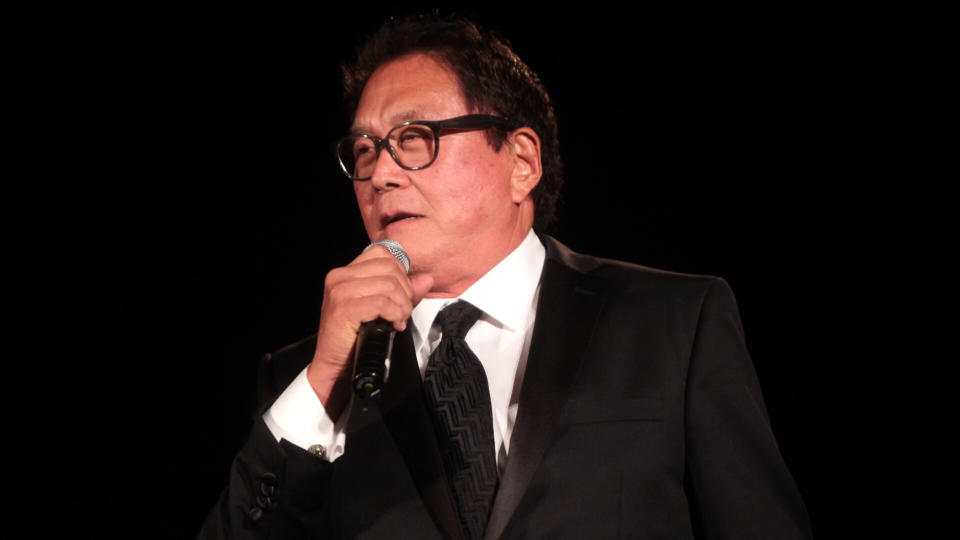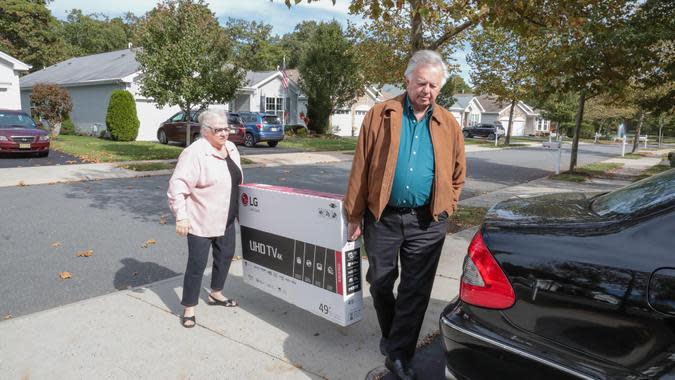Money Expert Robert Kiyosaki Says You Shouldn’t Work for Money — Work for This Instead

As Robert Kiyosaki grew up, he had the unique opportunity of having two father figures in his life who imparted financial advice. One was his actual father -- aka "poor dad" -- who was educated and worked for others all his life. The other was the father of his best friend -- aka "rich dad" -- who opted for entrepreneurship instead of formal education.
Kiyosaki's experience with the two men led him to write several books based on money and investing and how to get rich -- or at least as close as you can. Published over two decades ago, Kiyosaki's book "Rich Dad, Poor Dad" continues to reign as one of the top-selling personal finance books. His unique perspectives on money revealed in the book and his financial success are the result of being mentored by his rich dad, and results in being one of our favorite personal finance books.
Read on for Kiyosaki's quotes on finances, to find out why you shouldn't work for money and to see how you can leverage Kiyosaki's advice to grow your own wealth.
I'm a Financial Advisor Who Works With Wealthy Families: These Are the Best Ways To Transfer Wealth
Find Out: How To Get Cash Back on Your Everyday Purchases

Does It Take Money To Make Money?
"The idea that it takes money to make money is the thinking of financially unsophisticated people."
Kiyosaki believes that to make money, you have to change how you think about money. For example, you don't have to spend your life waiting to have a lot of money to start making money. Instead, you can start with a small investment that can help you work toward earning a substantial amount.
What This Means for You
Granted, it's important to understand that what Kiyosaki is saying is not that you cannot turn your savings into even more savings. While you don't need money to make money, it certainly helps a lot. What he does mean, though, is that you can't let starting small scare you away from investing entirely. Many investing apps and brokerages allow you to start with very small amounts -- even just $1.
$10,000 Quarter: This 1999 Georgia Coin Is Worth Big Money Because of an Error
I'm a Millionaire: Why I'm Not Passing Generational Wealth to My Kids

Education Is Key
"I am concerned that too many people are focused too much on money and not on their greatest wealth, which is their education."
Wanting to make more money and focusing on the day you'll have the opportunity to become rich are dead ends. You have to understand how to achieve your financial goals to experience success. The keys to true wealth are being flexible, keeping an open mind and being ready to learn, Kiyosaki said. By working toward these things, you'll become richer and richer.
What This Means for You
One need simply compare what an increase of a single percentage point in your portfolio's average return means over the course of 10, 20 and 30 years. If really understanding how your money is working for you means that you can carve out extra space in your budget to devote to saving or making better investments with lower fees, that knowledge is the gift that keeps on giving.
So focus on understanding your finances, your goals and how those two things will work in tandem rather than some number you want to hit.
Jaspreet Singh on the 75/15/10 Rule: This Is How the 1% Manage Their Wealth

Investing Matters
"Financial struggle is often the direct result of people working all their lives for someone else."
To become financially secure, Kiyosaki recommends that you "mind your own business," which means you shouldn't just focus on the income you're making by working for someone else. That income can only get you so far. Instead, work toward utilizing part of your income to build your assets, because assets can generate additional income.
What This Means for You
Take one look at the Forbes list of the richest people in the world, and you should rather quickly arrive at a similar conclusion. After all, Jeff Bezos' salary at Amazon was well under six figures during his time as CEO. He got to be the wealthiest man in the world -- prior to his divorce -- purely by owning a 16% stake in the company he founded.
So while most of us will have to work for a paycheck our entire lives, really expanding your wealth requires looking outside that structure for more options to grow your money.

Understand Assets vs. Liabilities
"You must know the difference between an asset and a liability, and buy assets."
Kiyosaki believes that rich people buy assets, and middle-class and poor people buy liabilities that they think are assets. Simply put, assets put money into your pocket and liabilities take it out. And a great many things you buy -- most clothes, any car that's not a vintage collector's item and even a lot of jewelry are a few prominent examples -- are going to lose value the longer you have them.
What This Means for You
When you spend money on things that will never deliver a financial return, such as new cars, expensive clothes and frequent vacations, they are considered liabilities. But when you work toward investing in real estate other than a primary residence, stocks, bonds, gold and other commodities, they are considered assets: items that can generate income for you.

Look To Your Own Finances
"Many financial problems are caused by trying to keep up with the Joneses."
Middle-class earners usually don't get rich, according to Kiyosaki. Instead, they go deeper into debt by buying liabilities to "keep up with the Joneses" -- trying to imitate the lifestyles of their friends and family members. Instead of buying liabilities, work toward investing in income-earning assets.
What This Means for You
Unless you're an accountant, you probably don't have the first idea what's going on with your friends' or neighbors' finances. They could be neck-deep in debt or relying on family money to move into that huge house or renovate their kitchen.
And if trying to match the success they're projecting leads you to take out a mortgage you can't afford or sink money into get-rich-quick schemes, you'll end up setting back your financial plans in a big way.
I'm a Financial Planning Expert: Here Are 5 Things You Should Never Spend Money on If You Want To Be Rich

Cars Are Not Assets
"A new car loses nearly 25% of the price you pay for it the moment you drive it off the lot."
Even if you pay cash for your vehicle and you own it, it's never worth as much as it is right before you leave the car dealership. Cars are one of the prime examples of a depreciating asset, meaning you basically bleed money from your net worth every year you own it.
What This Means for You
Kiyosaki believes that cars are not a true asset, even if your banker allows you to count it as one. Instead, choose to build up your true income-earning assets first. Then, you'll have gained more financial intelligence and found a way to pay for that new car if you really want it.

Buy Luxuries Last
"An important distinction is that rich people buy luxuries last, while the poor and middle class tend to buy luxuries first."
The middle class and poor tend to buy luxuries first because of a desire to look rich. Although they look like they can afford things like the rich, the reality is that they entangle themselves deeper in debt. There's a big difference between being rich and looking rich, and people with a high net worth tend to be very familiar with the distinction.
What This Means for You
Rich people first build assets that will pay for the luxuries before actually buying something. Work toward building your asset portfolio before purchasing luxury items.
The first step to really being able to enjoy the sort of fancy stuff the rich use to make their lives so comfortable is building the sort of income and portfolio that means you won't immediately be filled with regret when you open up your credit card bill.

Understand Investing Strategy
"The problem with 'secure' investments is that they are often sanitized. That is, made so safe that the gains are less."
Increasing your financial intelligence by gaining a greater understanding of financial statements and investment strategies -- and building familiarity with the market and the laws -- is how you can stop playing it safe and get ahead financially, according to Kiyosaki.
What This Means for You
As you become more financially intelligent, you'll also become more skilled at spotting good investment opportunities, which might eventually lead to more money. While chasing bigger returns is often a recipe for disaster, the more refined your judgment becomes, the easier it is to write off the get-rich-quick schemes without overlooking the major opportunities.
Find Out: 10 Stocks That Could Be the Next Apple or Amazon

Learn To Spot Opportunities
"Great opportunities are not seen with your eyes. They are seen with your mind."
What might seem like a bad investment opportunity to someone else can be viewed as a potential gold mine to you -- if you hone your financial intelligence and understand how to navigate investment risks.
Most people never achieve wealth because they aren't financially trained to see the opportunities, according to Kiyosaki.
What This Means for You
In his book "One Up on Wall Street," famed investor Peter Lynch promotes the idea of "investing in what you know." His point is that no individual investor can really hope to do a better job of investing in blue chip stocks than the major fund managers with their armies of analysts.
The truly unique opportunities are going to be just that: unique. And understanding when you might actually hit on something most investors and experts haven't is essential to have any chance of beating the market.

Beat Laziness With Greed
"Whenever you find yourself avoiding something you know you should be doing, then the only thing to ask yourself is, 'What's in it for me?' Be a little greedy. It's the best cure for laziness."
Kiyosaki believes that you can beat laziness with a little greed. He suggests asking yourself this question: "What would my life be like if I never had to work again?" Pay attention to your answer. The desire for something better -- or a little bit of greed -- can motivate you to do great things.
What This Means for You
Consider this the junior version of Gordon Gekko's "greed is good." However, while generosity is certainly a trait to be admired, it's worth noting that you can still be a generous person at heart while looking out for yourself. Your time is limited, and you only live once. Be ready to put yourself and your family first when you really need to -- it's worth it.

Learn About Investing Before You Invest
"Most people simply buy investments rather than first investing in learning about investing."
The only real asset you possess is your mind, according to Kiyosaki, so you should invest in education first. A good understanding of what might make a particular investment good or bad is the only way to really sustain success over time.
What This Means for You
Put another way, "Give a man a fish and you feed him for a night. Teach a man to fish and you feed him for the rest of his life." Kiyosaki suggests going to financial seminars and listening to financial audio books to increase your financial intelligence and gain different perspectives. Then, you'll be better prepared to invest in a way that will help you make significant financial gains.
See: Which Bank Gives 6% Interest on Savings Accounts?

Use Savings To Create Money
"The rich know that savings are only used to create more money, not to pay bills."
A common bad habit of those who financially struggle is "dipping into savings," according to Kiyosaki. While your emergency fund is there for, well, emergencies, the more you use it, the less help it is. Keeping your savings where they are -- so they can earn interest -- matters in the long haul.
What This Means for You
When you're under pressure to come up with money, don't get it from your savings. Instead, force yourself to think of ways you can make more money. By doing so, you'll have created a new source of cash flow and increased your financial intelligence.

Learn About Liquidity
"The sophisticated investor's first question is: 'How fast do I get my money back?'"
One way to recognize a good investment opportunity is to understand how quickly it can benefit you financially. Investments that are more "liquid" or offer a return sooner allow you to reinvest your profits sooner and continue multiplying your returns.
What This Means for You
For example, before you put money down on an investment property, you need to determine how quickly you can start making money with it. Being able to rent the property consistently can generate income that will help you pay off the property. Once it's paid off, you can use that income to add more income-producing assets to your portfolio.

Be Generous
"Whenever you feel 'short' or in 'need' of something, give what you want first and it will come back in buckets."
Kiyosaki believes that you should provide the thing that you need to others first in order to receive it yourself. After all, it's hard to expect generosity from others that you're unwilling to act on yourself.
What This Means for You
If you need to make more sales in your business, help someone else sell something. To gain more money, donate some funds to charity. To make more contacts, help others make contacts with people in your network. This might be less concrete, but it's hard to argue with putting out good karma.
More From GOBankingRates
Joel Anderson contributed to the reporting for this article.
This article originally appeared on GOBankingRates.com: Money Expert Robert Kiyosaki Says You Shouldn’t Work for Money — Work for This Instead

 Yahoo Finance
Yahoo Finance 